LATEST NEWS
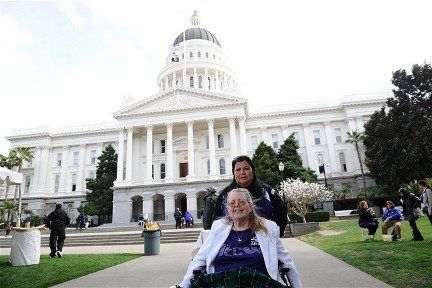
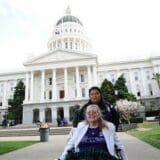
Over 400,000 elderly and disabled California residents depend on the In-Home Supportive Services (IHSS) program to keep them living safely and independently at home. Nearly half this number live in Los Angeles County. Over the last few weeks my colleagues have written articles that illustrate L.A. County caregivers’ need for a living wage and show the positive economic impact of that wage for all L.A. residents.
I am an in-home caregiver for my daughter Elizabeth, who suffers a mental disability. She is 21 years old, has autism and needs fulltime supervision. Any parent who has an autistic child understands the unique challenges we must deal with on a daily basis — such as my daughter needing to go to a special school, having to work with social workers who check in on her, juggling multiple doctors and administering her different medications throughout the day.
I am writing this article because I know my daughter deserves the very best care.
» Read more about: Home-Care Workers to Sacramento: Let’s Get Healthy! »


Community members recently wrapped up the three-pronged Long Beach Rising! civic-engagement program aimed at increasing residents’ participation in local politics. I’ve been part of the civic-engagement committee, which formed in November 2011 to address low voter turnout in local elections —particularly from people of color and low-income communities.
From the outset committee members knew we wanted to do something about the persistent disparities in voter participation (and the consequences this has for city policy), but didn’t have a blueprint for this sort of endeavor. So we set out to create one.
From the start there was a high level of enthusiasm, with members from nearly 20 community organizations convening last November to begin planning Long Beach Rising! This process was facilitated by the Long Beach Coalition for Good Jobs and a Healthy Community.
In January, 35 people graduated from our inaugural training program.


L.A. Observed business writer Mark Lacter recently added his voice to the steadily rising chorus of sane commentators calling for an end to the panic jabber about high gas prices. Conservative politicians have been lustily blaming higher pump prices (along with sun spots) on the Obama administration, but Lacter answers them with an inconvenient truth: Prices have actually leveled off and have even crept down a bit lately. And they’re not all that different from last spring’s:
“If you go back to May, 2011,” wrote Lacter, “an average gallon of regular in L.A. was running nearly $4.30 a gallon, and . . . [t]hat’s not even adjusting for inflation.”
Lacter includes a nifty Washington Post video which posits that part of the panic lies in the psychology of drivers having nothing to do when filling up but stare at those numbers spinning upwards on pumps.
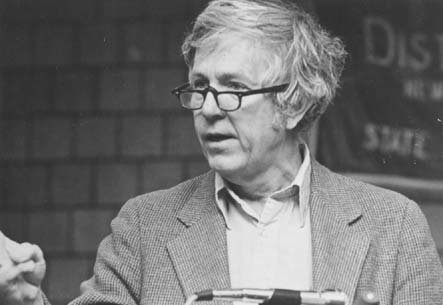

Fifty years ago this month Michael Harrington wrote a book, The Other America: Poverty in the United States – a haunting tour of deprivation in an affluent society – that inspired Presidents John Kennedy and Lyndon Johnson to wage a war on poverty. This slim, 186-page volume became a best-seller and became required reading for social scientists, elected officials, college students, members of study groups sponsored by churches and synagogues, reporters and intellectuals, the new wave of community organizers and the student activists who traveled to the South to join the civil rights crusade. Harrington was soon in great demand as a speaker on college campuses, union halls and religious congregations. Reporters and television talk-show hosts wanted to interview him.
Harrington wrote that the poor were invisible to most Americans because they lived in rural isolation or in urban slums. Once they become aware of the situation, Americans should be ashamed to live in a rich society with so many poor people.
» Read more about: Michael Harrington's Other America: 50 Years Later »


Am I allowed to write this? Is it against company rules? Before I tell you why I ask, let me explain a little about myself.
I’m a split personality of sorts. I’m a diligent employee. I’m always punctual in the RH restaurant where I work as a server at the Hyatt Andaz on Sunset in West Hollywood. I can describe every dish in detail. I enjoy getting to know my guests. I smile. I’m warm. I go above and beyond to offer them a great experience. I have many return guests. Some of them even bring me bottles of wine. I’ll refer to this first character as my “A” personality.
My “B” personality exists outside of the confines of Hyatt. Here are a few character identifiers: He’s a passionate union activist for UNITE HERE Local 11. He shows up extra early to the many rallies, strikes and pickets that are held outside of his place of employment.


You won’t read these headlines in your morning paper: “Public Sector Union Leads on Job Creation and Helping the Environment. Government Agency Exceeds Goals.” Not very good copy from the perspective of opinion writers and editors.
You can’t entirely blame the media. It’s human nature. You notice the power outage, not the lights that go on every day. Still, the constant attacks on the public sector (and public sector employees especially) make it important to point out the things that do work.
So bear with me. Last year, the Los Angeles Department of Water and Power was asked by the city to take charge of an $8.5 million American Recovery and Reinvestment Act program to weatherize the homes of low-income customers. The nonprofits that typically do the work didn’t feel they had the capabilities.
Brian D’Arcy, Business Manager of the International Brotherhood of Electrical Workers Local 18 —
» Read more about: Union and Government Partner for Good of City »


Now that we know corporations are people, it may be time to wonder: Is it possible that corporations have feelings?
Does Walmart, Corporate Person, feel bad as communities reject its plans to move in next door?
If so, the world’s largest retailer is bravely hiding its hurt as it marches, head held high, into Los Angeles’ Chinatown. Community opposition erupted a couple of weeks ago as soon as word got out that Walmart planned a store at Chavez and Grand, but Walmart hasn’t flinched publicly. (Queries to Walmart for this post were not answered by publication time.*)
*Update: Steven V. Restivo Sr., Walmart’s Director of Community Affairs, later responded with this message:
“Now that our Walmart Neighborhood Market has received all necessary approvals, we look forward to serving downtown customers soon. We appreciate all the community support to date and will continue to engage with residents and businesses in the area to talk about the jobs,
» Read more about: Walmart: No Friend to Local Business, Studies Show »
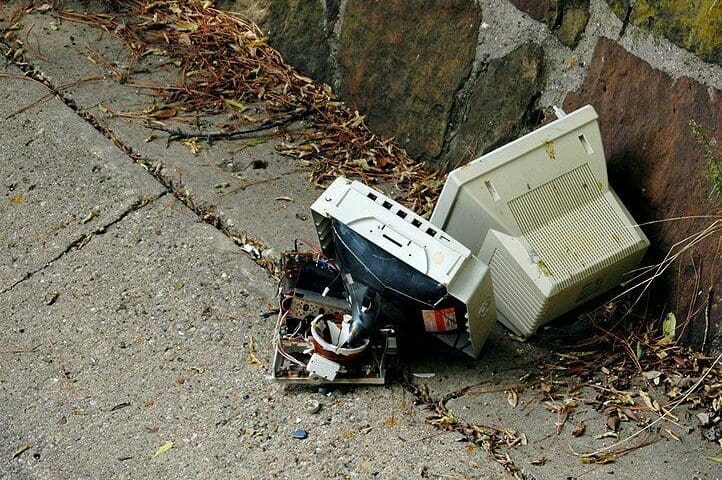

Last week I made up my first Twitter hashtag: #wonkygeekheaven. Which is exactly what the first Los Angeles Good Jobs, Green Jobs conference was for me. There was lots of talk about LAANE’s Don’t Waste LA campaign (which my company, Isidore Electronics Recycling, is a new partner of), passionate discussions with labor and environmental groups, analysis of the economic impact of climate change policy on cities and a rally against a big bad waste company.
Like I said, #wonkygeekheaven.
I never thought I would start an electronics recycling company. But while in my twenties I did a stint in (then) City Council President Eric Garcetti’s office, where I focused on public safety and gang intervention and prevention. There, I saw the same truth over and over: At-risk people and those exiting prison need jobs. I headed to graduate school to figure out how to make that happen,
» Read more about: My Quest for a Greener, Cleaner Tomorrow »


Here’s a story you may not be hearing about anytime soon on KPFK — Pacifica, the nonprofit foundation that runs 90.7 FM in L.A., as well as four other progressive radio stations around the country, has retained a high-powered labor-bashing firm. Jackson Lewis LLC, described by the AFL-CIO as “America’s number one union-buster,” is on the Pacifica payroll. “All we do is work,” its site announces – right next to its “Union Free” portal.
Those with long memories of past internecine battles at Pacifica will hardly be surprised to hear about the latest turn of events. This, of course, makes it no less depressing. At a time when right-wing forces are waging war against the rights of American workers to be represented by a union, now is certainly not the time for Pacifica to side with labor’s antagonists.
» Read more about: WebHot! Surprise (Not): Union Busting at Pacifica Radio »
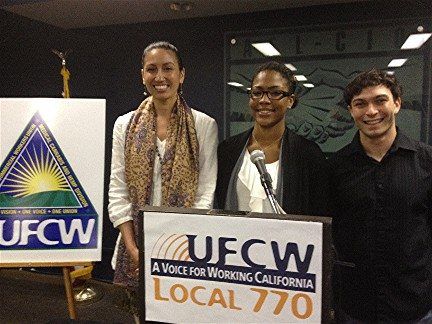

I am an office assistant at the Venice Beach Care Center, a medical cannabis dispensary. I’m also a student at Santa Monica College studying kinesiology. I love my job because it gives me a chance to give back and make a difference — some people who live in pain have chosen an alternative way of healing to manage their sickness, and we are here for them. My job also gives me a chance to interact with people, sharpen my communications skills and develop compassion for patients who need our help.
Every day I wake up and realize I’m a part of something new and historical — and I hope that people’s views of the medical cannabis industry and of employees like myself are changing. Just like other American workers, I dream of a better life for myself — the future I create starts here today, small and local.
Working at the dispensary has made it possible for me to put myself through school and help support my mom.
» Read more about: Blunt Talk: What Marijuana Pharmacy Workers Want »


Last week, the AFL-CIO released a statement – “Restoring Democracy” – on the Supreme Court’s historic ruling in the Citizens United case.
The federation eloquently and accurately inveighs against “excessive corporate influence” in the political process, calling for “greater balance . . . transparency and disclosure . . . restoring Congress’ ability to regulate campaign spending,” and “abolishing corporate ‘personhood.’” If necessary, the AFL states, we should pass a Constitutional amendment to overturn Citizens United. To be sure, all of these things are true: Citizens United is bad for democracy in general, and especially bad for labor, as it makes the political playing field further unbalanced in favor of corporations and the wealthy.
In the spirit of full accounting, though, let’s acknowledge that the ruling does give labor something: For the first time in the modern history of a presidential race,
» Read more about: Cash of the Titans: Life After Citizens United Ruling »
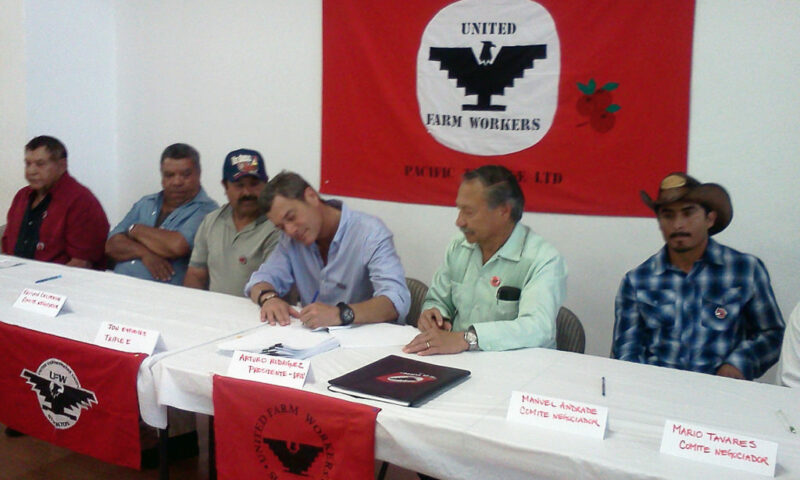

Anyone involved in the United Farm Workers campaigns of the 1960s and ’70s will tell you how critical those efforts were – not only to the well-being of farmworkers, but to the participant’s identity and the development of his or her views on labor and the world.
Many activists, like myself, were not vineyard or orchid pickers, but merely college students who helped organize local boycotts and picket lines far from the state’s embattled valleys. Yet even we sometimes glimpsed first-hand the epic human struggles that were transforming California’s agriculture, as I did during a brief summer stint in the 1973 grape strike outside Fresno.
To this day sense impressions remain vivid: The stifling 104-degree heat of the picket lines; the revivifying cold of the Kings River at night; the sweet sound of Superior Court Judge Peckinpah (Wild Bunch director Sam’s brother) ordering the release of thousands of farm workers from jail after they’d been arrested for protesting;
» Read more about: A People’s History of the Farmworkers Movement »


Calling on California’s leaders to invest in their state, the California Labor Federation (CLF) today unveiled an ambitious plan to pull the state out of its economic slump.
The seven-point plan begins by urging construction of the long-planned, oft-fought high-speed railway line that would connect San Diego, Sacramento and the Bay Area. Only a few years ago this seemed like a staggering but plausible infrastructure project – a magic bullet train, as it were, that would create thousands of good, lasting jobs. But when the recession hit, it stalled – and since then territorial politics have stopped the project in its tracks, along with some new cost projections for a much higher than expected construction price tag. The CLF plan asks legislators to begin releasing money from Prop 1A bonds that were passed by voters in 2008.
The CLF plan’s other planks include the following:
» Read more about: Calif. Unions Push for Jobs, Push Back on Pensions »


I raise money for LAANE, the Los Angeles Alliance for a New Economy. Asking other people for money isn’t something most people are comfortable with, but I do it every day because it’s the way I serve, how I heal the world. It’s the thing I can do, and I couldn’t look into the faces of people struggling in my community and say, “Sorry, it felt weird to ask for a check.” But I often wonder, “Who gives and why?”
A lot depends on knowing the answer to that question, and the truth is we don’t always have one. We know that people give because they are asked. If you don’t ask, you don’t get. But we get turned down a lot even when we do ask. Sometimes our cause just doesn’t resonate with the donor, and that’s okay. But sometimes – a lot of the time, most of the time – a donor is a donor because they have some spark in them that demands they give back.
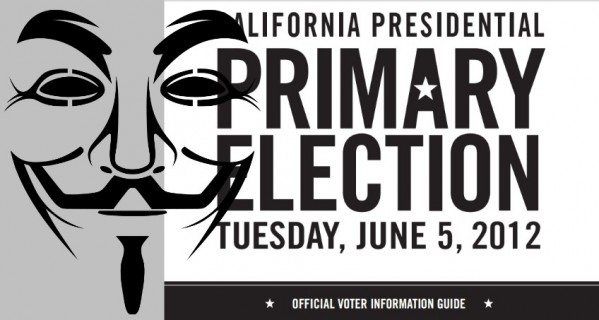

We’re thoroughly non-partisan here at Frying Pan News, but still we get many questions about voting. Most of them are about American Idol, but once in a while someone wants to know about elected officials. And while we still won’t tell you how to vote (though Professor Wagstaff’s dictum isn’t a bad place to start), we can happily answer some of your process questions.
Q: Hey, I heard a lot recently about voters “making mischief” in the presidential primary in Michigan. ’Sup with that?
A: It’s true—at least it’s true that you heard a lot about it, though there’s little evidence of any actual mischief-making. But some states do allow (just about) anyone to vote in (just about) any primary. In Michigan, the story goes, some Democrats – convinced that Romney would be the stronger opponent in the fall – crossed party lines to vote for Santorum in the primary,
» Read more about: Making Mischief in California Primaries »


By Johnny 5 Hanrahan
I, along with 30 other talented, hardworking crew members, was fired recently from a successful, internationally popular TV show called 1000 Ways to Die. Our crime: Trying to unionize. Joining the union would allow us to have health insurance — something that is not asking for too much, especially from a hit show. It is easy to take advantage of a reality TV crew in this economy, especially for low-ball rates, by having members work 70-plus hour weeks on their feet, as they make nearly minimum wage in a non-union atmosphere. We wanted the opportunity to live the better, healthier lives which we deserve; hence we contacted unions to help us with that. “Together we are what we cannot be alone. United we stand, divided we fall.”
Reps from the Teamsters and IATSE (International Alliance of Theatrical Stage Employees) came to the set on our behalf —
» Read more about: Reality TV Bites: “Blue Collar” Show Fires Its Workers »


By Kate Sheppard
(This post originally appeared on Mother Jones .)
Climate Central has released a new in-depth report on the combined impacts of rising seas and storm surges. With rising water levels, more people and property are at risk—especially during storms, which force water farther inland. Here’s an excerpt from the executive summary:
Global warming has raised sea level about eight inches since 1880, and the rate of rise is accelerating. Scientists expect 20 to 80 more inches this century, a lot depending upon how much more heat-trapping pollution humanity puts into the sky. This study makes mid-range projections of 1 to 8 inches by 2030, and 4 to 19 inches by 2050, depending upon location across the contiguous 48 states.
Rising seas dramatically increase the odds of damaging floods from storm surges. For more than two-thirds of the locations analyzed (and for 85% of sites outside the Gulf of Mexico),
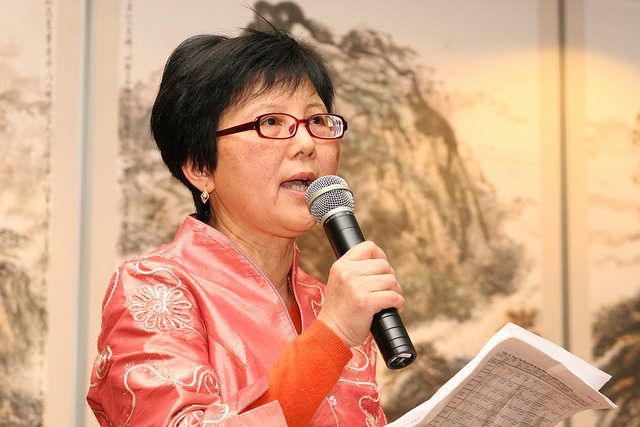

By Julie Chow
In a soon-to-be released report, the UCLA Center for Health Policy Research states, “Paid caregivers caring for recipients of Medi-Cal fare the worst in monthly income, job stability, home ownership, health insurance coverage, delays in obtaining medical care and food security. Data from the 2009 California Health Interview Survey suggest that paid Medi-Cal caregivers face hidden costs and are at risk for continued economic uncertainty.”
As a caregiver for over 10 years, and as part of my union’s Los Angeles contract committee, I can tell you that the statement above is more than accurate. We’ve heard from hundreds of our caregivers — their top concerns are job/wage security and access to quality health care. So, as we continue to negotiate with Los Angeles County, these are two of our top priorities.
We recognize that this economy has affected more than just ourselves; we see it in our neighbors,


Most of us – at least the 87 percent or so of us not protected by collective bargaining agreements – have to worry about job security. With only a few exceptions, all of us can be fired for any reason – or for no reason at all.
Two California news “scandals” brought this into sharp relief this week, as a couple of public employees found themselves under fire for some extracurricular activities.
In one case, Daniel Richards, president of the state Fish and Game Commission, shot and killed a mountain lion during a hunting trip in Idaho. In another case, some students discovered that Oxnard middle school teacher Stacie Halas had shot a porn video. Both are facing some degree of popular outrage, and calls for their dismissals.
First things first: No one has yet alleged that either of these two has violated any laws.
» Read more about: Hunting and Porn: Job Security in California »